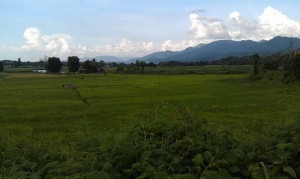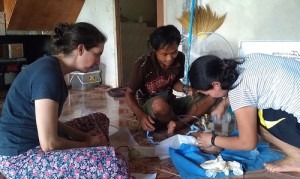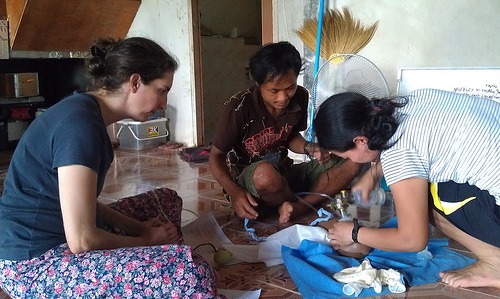By Annie Dominguez
The following slightly edited excerpts from the “Learning as We Go” blog are republished by permission of Dr. Annie Dominguez, a physician at the Salud Family Health Center in Commerce City, Colo. She recently flew with colleague Sonia Graber, a nurse practitioner, to Thailand where they helped train medics in Helping Babies Breathe techniques.

Sept. 13—Thailand…has been a primary refuge for those fleeing the violence [to the west] in Myanmar. According to the UNHCR, 90,000 Burmese refugees currently live in Thailand. Nine closed camps opened in the 1980s, and some of the refugees have been confined there for more than twenty years. The Thailand Burmese Border Consortium reports that an estimated 450,000 Burmese nationals are currently displaced along the east and south border. The refugees and IDPs, or Internally Displaced People, live in terrible poverty and often have little or no access to medical care.
Free Burma Rangers (FBR) is a non-governmental organization that works to document the refugee situation and alleviate the sufferings of Burmese IDPs. I will be teaching Helping Babies Breathe (HBB) to a group of Burmese medics being trained by Free Burma Rangers. The Huffington Post had a great article (with great photos) recently on “the Jungle School of Medicine.” The mission of the school is to train indigenous health workers to provide world-class health care to their people. I am so honored to be a part of their work.
Sept. 16—…The Mae La Refugee Camp (home to 45,000 IDPs) has a maternity hospital, staffed entirely by members of the Karen (one of the ethnic groups that have fled persecution by the Burmese government). They have been able to reduce their Infant Mortality Rate significantly. I hope that introducing HBB among more of the Karen medics and their FBR partners, will be another step toward helping more babies survive.

Sept. 19—Day One Teaching—I woke up [in Thailand] nervous: nervous about translation, nervous about setting up, nervous about making some huge cultural gaffe that would offend all the medics we were teaching. We had breakfast in our stunning guesthouse and went to the truck only to find a flat tire.
An hour later, we were on our way up the mountain to teach.
We had a class of 12 medics and a handful of expat medical professionals (midwives, midwife students, RNs, and MDs) who were all eager and ready to start.
The HBB curriculum is very hands-on. We taught for a few minutes (all facilitated by our excellent translator), and then the medics got to try their new skills on the “NeoNatalies.” Then we’d teach some more, and practice some more. The [fake NeoNatalie] babies were a hit.
Some of the medics are talented actors and leapt into the drama of the simulated birth with gusto, which made for a fun day of teaching. They were attentive, quick to learn, and so gracious with us. If we were terribly offensive, we never would have known.
I guess when you’re far from home, no one knows quite as well as a refugee how to make you feel at ease.
Sept. 21—Day Two Teaching—…This day was full of laughter and good connections. We heard more stories of the medics, how long their journeys had been to get to the school, and a few of their hopes for the future.
After a long afternoon of testing, which everyone passed, they had a celebration feast. They gave us traditional bags and a beautiful song of blessing.
Indeed we were blessed by this brave and determined group of students.
Sept. 26—(Dr. Dominguez and Sonia Graber finished their trip with a bicycle tour of Thailand’s Salawin National Park and a Thai cooking course. After her return from Thailand and her reunion with her husband, Sam, and their four kids, Dr. Dominguez wrote the following post.)
…The folks at FBR and Partners are really serious. They risk their lives– not only from land mines and the Burmese army, but from malaria and dengue–on a daily basis, for the cause of justice. Their rangers hike for months at a time, hauling half their weight on their backs, so that they can document the abuses happening there and provide life-saving medical treatment and education. (One of them told me that she wished she had cut off the handle of her toothbrush so she wouldn’t have had to carry the extra weight around.) It makes me want to do something.
What can I do? I can pray: for them, for their safety and courage. For leaders to repent and take justice more seriously than power. Honestly, if leadership were truly about servanthood, instead of about power, we’d see a lot more justice in this world.
Proverbs 31:8-9: “Speak up for those who cannot speak for themselves, for the rights of all who are destitute. Speak up and judge fairly; defend the rights of the poor and needy.”
I can work hard for justice in my little corner of the world, too. Justice in the form of health care for everyone. Justice in the form of standing up for the downtrodden, and speaking up against exploitation. And I can raise my little people to be bringers of justice. Pray-ers for peace. Do-ers of kindness.
Dr. Dominguez blogs at http://momco3.wordpress.com/.


